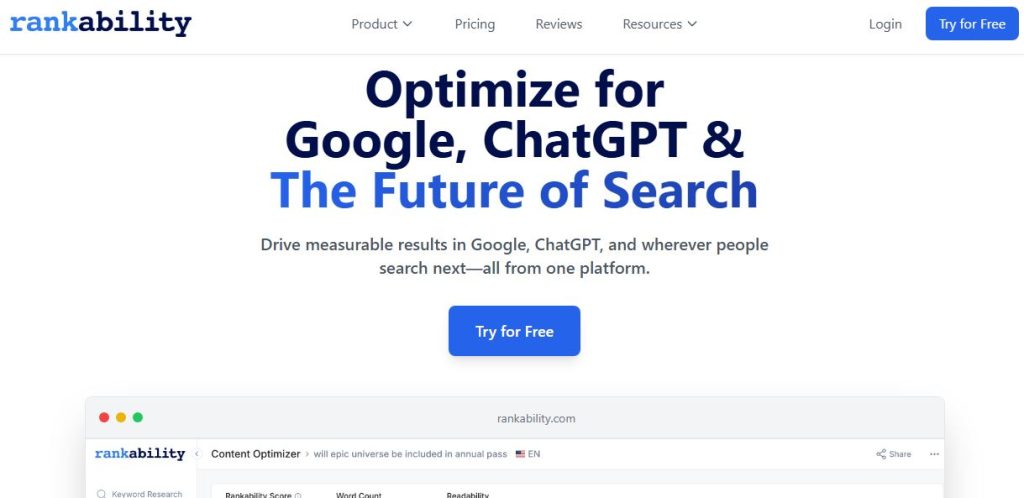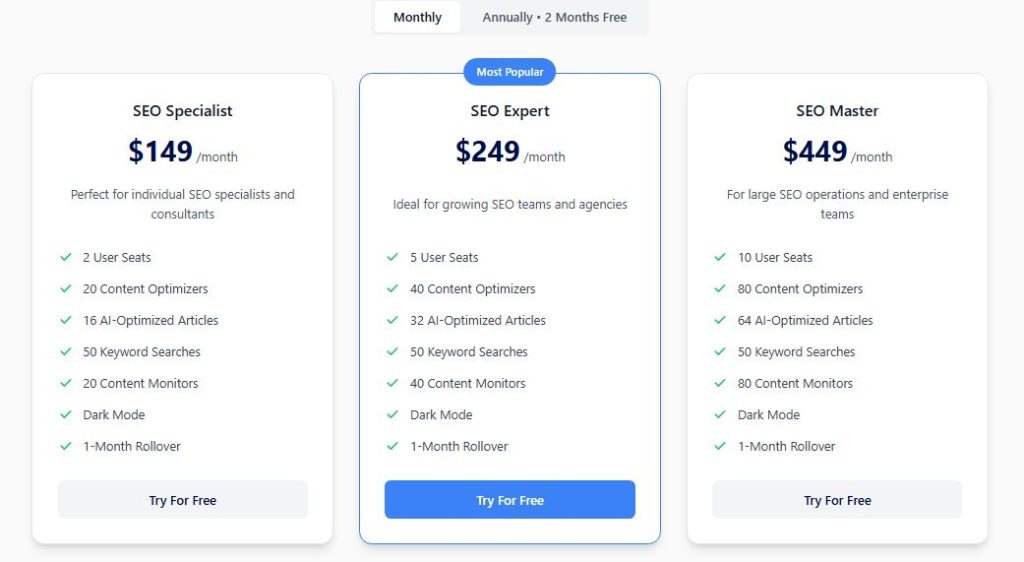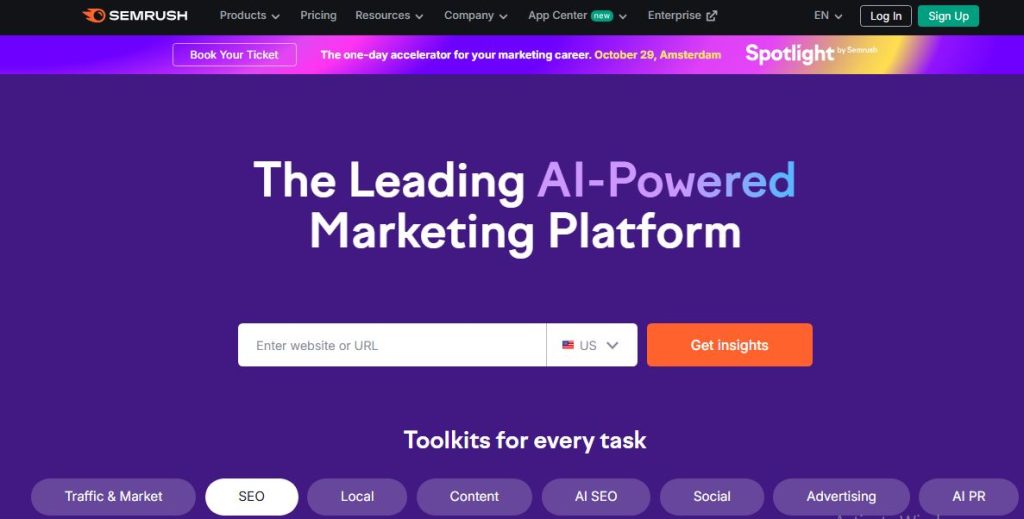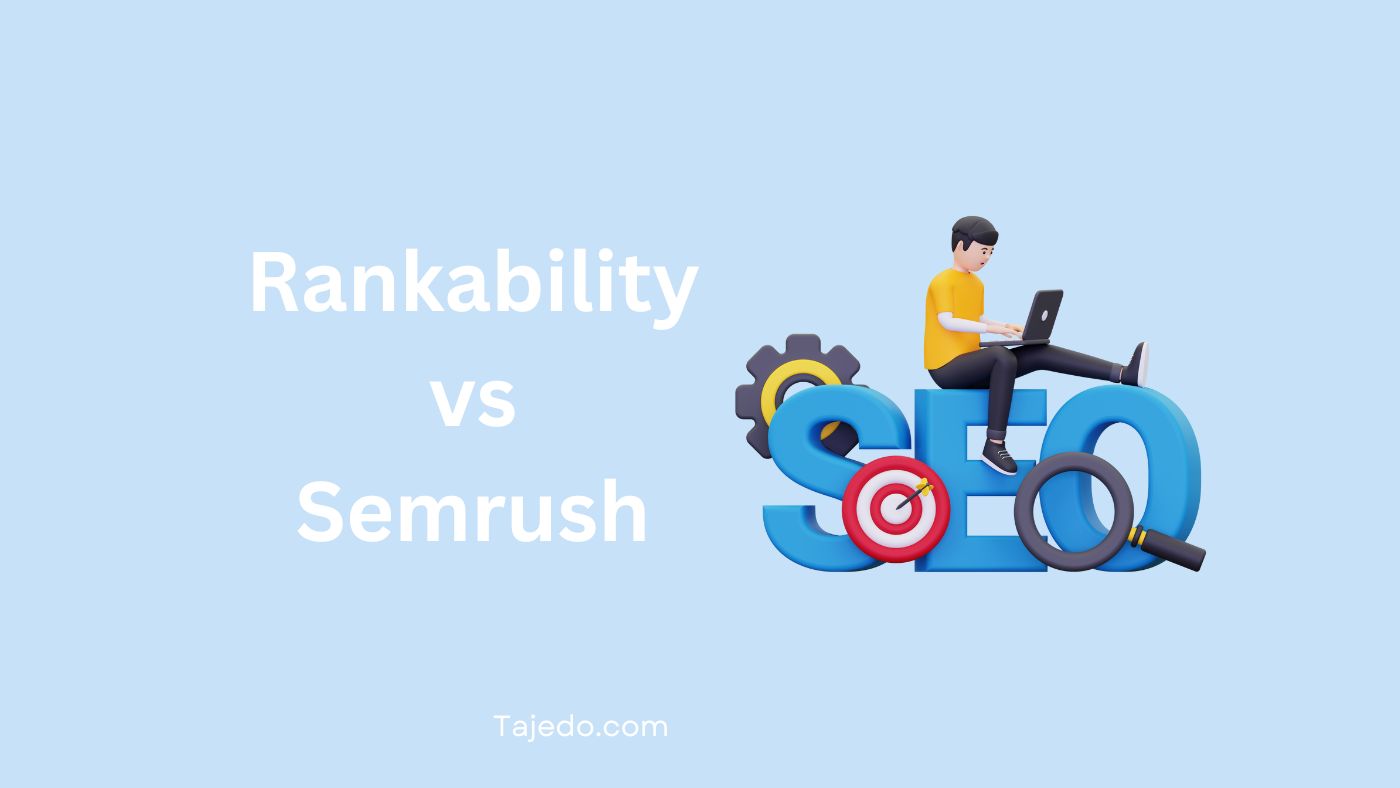Choosing between Rankability vs Semrush can feel overwhelming. Both claim to be the best SEO tool for boosting your rankings, but they’re built for very different types of users. Pick the wrong one, and you could end up wasting money on features you’ll never touch.
Here’s why it matters more than ever: the global SEO software market was estimated at about USD 74.8 billion in 2024 and is projected to more than triple in value in the coming decade.
Rankability is the newer, budget-friendly option designed for Content Optimization & Topical Relevance, while Semrush is the established giant recognized an all-in-One digital marketing platform.
So, which one actually makes sense for you? This breakdown will show you the strengths, weaknesses, and real-world benefits of both, so you can confidently decide which SEO software fits your goals.
Get Rankability’s Free trial here
Head-to-Head Comparison: Rankability vs Semrush
When you’re stuck choosing an SEO tool, sometimes a table says more than paragraphs ever could. Here’s how Rankability vs Semrush stack up when it comes to their core strengths, usability, and who they’re built for:
| Feature | Rankability | Semrush |
|---|---|---|
| Primary Focus | In-depth Content Optimization & Topical Relevance | All-in-One Digital Marketing Platform |
| Keyword Research | Focused on “rankable” keywords with content-centric data | Extensive database with advanced filtering and competitor insights |
| Content Optimization | Core feature with NLP analysis and scoring | Offers content templates and an SEO Writing Assistant |
| Backlink Analysis | Limited to no dedicated backlink tools | Comprehensive backlink analytics and link-building tools |
| Rank Tracking | Basic content performance monitoring | Detailed rank tracking with daily updates and competitor tracking |
| Ease of Use | Generally intuitive, with a focus on a linear workflow | Steeper learning curve due to the vast number of features |
| Pricing Model | Tiered based on content reports and keyword searches | Tiered based on projects, keywords, and reporting volume |
| Ideal User | Content creators, on-page SEOs, and SMBs | SEO agencies, in-house marketing teams, and data-driven marketers |
Takeaway:
- If your priority is content-driven SEO (writing, optimizing, and ranking articles fast), Rankability is lean, focused, and affordable.
- If you need a full SEO suite for keyword research, backlinks, competitor analysis, and reporting at scale, Semrush is hard to beat.
What is Rankability?

Rankability has carved out its space in the SEO world by zeroing in on what matters most today: content optimization and topical authority. Created by SEO expert Nathan Gotch, the tool is built on a simple philosophy — the best way to rank isn’t chasing every keyword, it’s creating in-depth content that fully answers search intent.
What sets Rankability apart is its data-driven approach to writing. Using Natural Language Processing (NLP), it scores your content against competitors and highlights the semantic gaps you need to fill. Instead of just stuffing in keywords, it helps you write content that’s comprehensive, relevant, and genuinely competitive in search results.
Key Features of Rankability
Content Optimizer
This is the crown jewel of the Rankability suite. It analyzes the top-ranking pages for your target keyword and builds a step-by-step roadmap to beat them. You’ll get a “Rankability Score” based on word count, readability, and whether you’ve covered the important terms and concepts Google expects (thanks to NLP analysis). Instead of guessing, writers get a data-backed checklist for creating competitive content.
Keyword Research
Unlike Semrush’s massive keyword database, Rankability takes a practical approach. Yes, it gives you search volume and keyword difficulty, but the focus is on whether you can realistically rank for a term with strong content. This makes it a smart choice for smaller sites that don’t have enterprise-level authority.
AI Content Briefs
Rankability helps speed up writing with AI-powered briefs. These include recommended headings, must-answer questions, and terms to weave in. For content teams, it’s a huge time-saver and ensures every article is aligned with SEO goals from the start.
Content Monitoring
SEO isn’t “set it and forget it.” With Rankability, you can track how your articles perform over time. It shows you what’s working and flags posts that need a refresh, helping your content stay competitive in the long run.
User Interface and Ease of Use
Rankability’s interface is generally clean and intuitive, especially for those who are primarily focused on content-related tasks. The workflow for creating and optimizing content is straightforward, guiding the user from keyword research to content brief generation and final optimization in a logical sequence. While there might be a slight learning curve in understanding how to best utilize the NLP-driven recommendations, the platform is designed to be user-friendly for content creators and SEOs of all skill levels.
Pricing

Rankability’s pricing is positioned as a premium, specialized tool. The plans are typically structured around the number of content optimizer reports and keyword searches a user can perform each month. While the entry-level price may be higher than some of the broader SEO platforms, the value proposition lies in the depth of its content optimization features and the included training.
Pros and Cons of Rankability
Like any SEO tool, Rankability shines in certain areas and has some trade-offs to consider. Here’s the straight talk:
Pros
- ✅ In-depth, NLP-powered content optimization that helps you create content Google loves.
- ✅ Streamlined workflow that takes you from keyword research to publishing without extra clutter.
- ✅ Actionable, data-backed recommendations that remove the guesswork from writing.
- ✅ Exclusive SEO training and mastermind calls, giving you direct access to Nathan Gotch and other experts.
Cons
- ❌ Limited scope compared to all-in-one platforms like Semrush.
- ❌ No deep backlink or technical SEO features, which advanced SEOs might miss.
- ❌ Not the cheapest option, which could be tough for those on a very tight budget.
Who is Rankability Best For?
Rankability is designed for people and businesses who want to win through content. Here’s who gets the most value out of it:
- Content marketers and copywriters who need structured guidance to create articles that rank. The optimizer’s step-by-step workflow makes content planning and writing a lot less guesswork.
- On-page SEO specialists who care about topical authority and semantic depth. Rankability’s NLP-driven insights give them the precision they need.
- Small to medium-sized businesses that want to grow their organic presence without the overhead of an all-in-one enterprise suite.
- Users who value expert guidance, since the included training and mastermind calls with Nathan Gotch add real, ongoing education that most SEO tools don’t offer.
In short, Rankability is best for anyone who believes content is the core of SEO and wants a tool that doubles down on making their writing competitive.
Get Rankability’s free trial here
What is Semrush?

Semrush is an undisputed giant in the world of digital marketing software. It’s not just an SEO tool; it’s a comprehensive suite that covers everything from keyword research and competitor analysis to social media management and advertising insights. Its core philosophy is to provide a single platform where marketers can manage and measure all their online visibility efforts. The sheer breadth and depth of its data, including a massive database of keywords and backlinks, make it a go-to choice for digital marketing professionals worldwide.
Key Features of Semrush
With more than 50 tools under one roof, Semrush is one of the most comprehensive SEO and digital marketing platforms out there. Covering everything from keyword research to competitor analysis and even PPC and social media, it’s truly an all-in-one powerhouse. Here are some of its standout features:
Keyword Magic Tool
Semrush’s Keyword Magic Tool is one of the largest databases in the industry, with over 20 billion keywords. It comes with advanced filtering options so you can zero in on the most relevant and profitable terms — whether you’re building content, running PPC ads, or chasing long-tail keywords your competitors missed.
Competitor Analysis Toolkit
This is where Semrush shines. You can peek into your competitors’ strategies — from their organic and paid keywords to backlink profiles and even their top-performing content. It’s like having a roadmap of what’s already working in your niche.
Site Audit & On-Page SEO Checker
Beyond content, Semrush runs deep technical SEO audits, flagging everything from broken links and duplicate content to mobile performance and Core Web Vitals. The On-Page SEO Checker gives tailored recommendations for optimizing individual pages.
Backlink Analysis & Link Building Tools
With a huge backlink index, Semrush lets you analyze your own profile as well as competitors’. The Link Building Tool even helps you identify prospects and manage outreach, turning link-building into a structured workflow instead of a guessing game.
Rank Tracking
The position tracking tool monitors keyword rankings across devices and locations with daily updates. For agencies and serious SEOs, this daily tracking is crucial for measuring the impact of campaigns.
Beyond SEO
Unlike Rankability, Semrush doesn’t stop at SEO. It also covers PPC research, content marketing tools, social media tracking, and even market research — making it a complete digital marketing suite.its breadth, Semrush is considered the go-to tool for anyone who wants deep data, detailed competitor research, and a single platform that does it all. The trade-off? It comes at a premium price and has a steeper learning curve.
User Interface and Ease of Use: Semrush
With so many tools, Semrush can feel overwhelming at first. The interface is packed with data and options, and the learning curve is steeper compared to focused platforms like Rankability. That said, Semrush does a good job of organizing its dashboard, and they’ve invested heavily in training resources.
The Semrush Academy offers free courses and certifications to help users get up to speed, which is a nice bonus. Once you’re comfortable, having all that data in one place becomes a huge advantage — especially if you’re juggling multiple clients or channels.
Pricing

Semrush employs a tiered pricing model, with different plans catering to freelancers, small businesses, and large enterprises. The plans are primarily differentiated by the number of projects you can manage, the number of keywords you can track, and the volume of reports you can run per day. While the subscription costs are substantial, the comprehensive nature of the tool often justifies the investment for those who can leverage its full capabilities. There are also various add-ons available for specific needs, such as local SEO and competitive intelligence.
Who is Semrush Best For?
Semrush is built for marketers who want the full digital marketing toolkit, not just content-focused SEO. It’s especially valuable for:
- SEO Agencies and Digital Marketing Professionals: The ability to manage multiple client projects, conduct in-depth competitor analysis, and generate comprehensive reports makes Semrush an industry standard for agencies.
- In-House Marketing Teams: Businesses with dedicated marketing teams will benefit from the collaborative features and the holistic view of their entire digital marketing landscape.
- Businesses with a Multi-faceted Digital Strategy: Companies that are actively engaged in SEO, PPC, content marketing, and social media will find immense value in having an integrated tool that covers all these bases.
- Data-Driven Marketers: Those who thrive on deep data analysis and want to explore every possible angle of their online visibility will appreciate the vastness of Semrush’s databases.
Pros and Cons of Semrush
Semrush is one of the most powerful SEO platforms available, but it’s not without trade-offs. Here’s the quick rundown:
Pros
- ✅ All-in-one suite that covers SEO, PPC, content, and more — no need to juggle multiple tools.
- ✅ Massive keyword and backlink databases, giving you one of the most complete views of the search landscape.
- ✅ Top-tier competitor analysis, with the ability to reverse-engineer your rivals’ strategies.
- ✅ Extensive learning resources and support, including the free Semrush Academy.
Cons
- ❌ Overwhelming for beginners, especially if you only need a few core SEO features.
- ❌ High pricing tiers, which can be tough for individuals or smaller businesses.
- ❌ Jack-of-all-trades trade-off — some specialized features aren’t as deep as what you’d get with standalone tools.
Rankability vs Semrush: Data Accuracy and Reliability
Both Rankability and Semrush pull from massive datasets and algorithms, but they approach accuracy differently.
Semrush has one of the most trusted reputations in the industry when it comes to data accuracy, especially for high-volume keywords and well-established websites. Its keyword and traffic estimates are considered reliable benchmarks, though — like any third-party SEO tool — they’re best used as directional insights, not exact numbers.
Rankability, on the other hand, is less about raw search volume precision and more about content competitiveness. Its accuracy shows up in the “Rankability Score,” which reflects how well your content is likely to perform if you follow its recommendations. Instead of fixating on numbers, it gives you a realistic roadmap for outranking competitors — and users often see results that back this up.
Pro Tip: Semrush = reliable for data-driven market analysis, while Rankability = reliable for content-focused, practical SEO guidance.
Get Rankability’s Free trial here
Final Verdict: Rankability vs Semrush
When it comes to Rankability vs Semrush, there’s no one-size-fits-all winner — it really depends on what you need, how you work, and what your budget looks like. Here’s the bottom line:
- If you’re a content creator, blogger, or small business owner focused on publishing high-quality content that ranks, Rankability is your best bet. It gives you a clear, step-by-step path to better on-page SEO and topical authority.
- If you’re an SEO agency, digital marketing pro, or in-house team managing multiple campaigns, Semrush is the stronger choice. Its breadth of tools — from competitor analysis to technical SEO — makes it ideal for complex strategies.
- If budget is tight, think about what you actually need. Semrush packs in more features, but it comes at a premium. Rankability is often the more affordable option if content optimization is your main priority.
- If you want a single platform to manage everything (SEO, PPC, social media, content marketing), then Semrush’s all-in-one approach is tough to beat.
Both tools are excellent, but they’re built for different kinds of users. Rankability is the specialist — laser-focused on content optimization and backed by expert guidance. Semrush is the generalist — a full digital marketing suite that covers every angle of online visibility.
The best choice comes down to aligning the tool’s strengths with your own goals and workflow. Do that, and you’ll set yourself up for stronger rankings, smarter campaigns, and real growth in 2025 and beyond.

